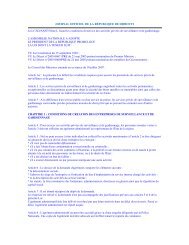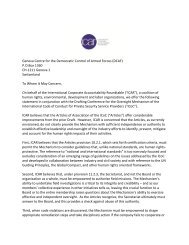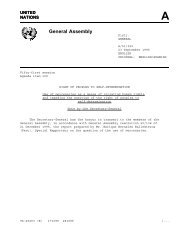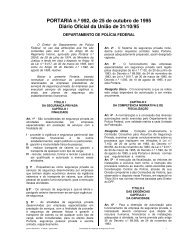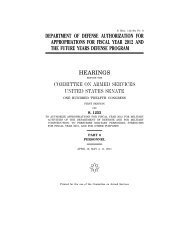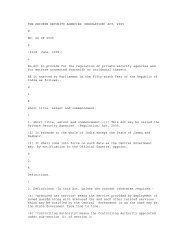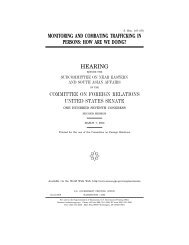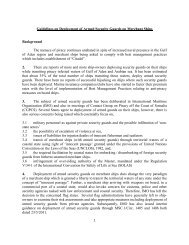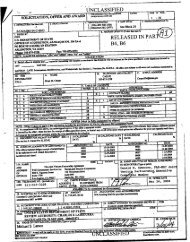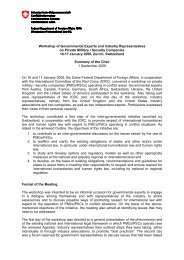Security Assistance; and Logistics - Federation of American Scientists
Security Assistance; and Logistics - Federation of American Scientists
Security Assistance; and Logistics - Federation of American Scientists
You also want an ePaper? Increase the reach of your titles
YUMPU automatically turns print PDFs into web optimized ePapers that Google loves.
guidance on stability operations that will evolve over time as joint operating concepts,mission sets, <strong>and</strong> lessons learned develop, <strong>and</strong> establishes DoD policy <strong>and</strong> assignsresponsibilities within the DoD for planning, training, <strong>and</strong> preparing to conduct <strong>and</strong>support stability operations.Inadequate Capacity in Iraqi Health Care SystemU.S. military medical treatment facilities located in Iraq provided emergency medical <strong>and</strong>surgical care to Iraqi military, police, <strong>and</strong> civilians for emergency conditions where life,limb, or eyesight was at risk. This care <strong>of</strong>ten included inpatient hospitalization until theindividual could be transferred to an Iraqi civilian medical facility that could provideongoing care. However, because <strong>of</strong> the lack <strong>of</strong> medical treatment capacity within theIraqi health care system, many <strong>of</strong> these individuals remain in U.S. military medicaltreatment facilities <strong>and</strong> receive ongoing care for extended periods <strong>of</strong> time.Costs <strong>of</strong> Health Care Provided to Iraqi NationalsThe initial costs <strong>of</strong> inpatient care using st<strong>and</strong>ard U.S. military medical treatment facilitybilling charges for an overnight hospitalization were approximately $30 million to $36million annually. The initial costs for hospitalization did not include additional expensesincurred for outpatient care, surgical care, intensive care unit services, consumablemedical supplies, blood products, or pharmaceuticals.Management Controls for Wartime Theater Medical Care inStability, <strong>Security</strong>, Transition, <strong>and</strong> Reconstruction OperationsManagement controls for wartime theater medical care in DoD deployable medicalsystems have not been fully developed. Policies <strong>and</strong> guidelines have been developed inthe area <strong>of</strong> medical logistics, supplies, <strong>and</strong> equipment to enhance interoperability,increase efficiency, <strong>and</strong> maximize resources with a focus on joint operations, butguidance is limited on controls necessary in complex humanitarian assistance, stabilityoperations, or other contingency operations where medical care is provided to non-U.S.populations.Policies <strong>and</strong> guidelines are needed to collect sufficient managerial accounting data toachieve economies <strong>of</strong> scale; minimize wastage <strong>of</strong> personnel, supplies, <strong>and</strong> otherresources; <strong>and</strong> allow leaders <strong>and</strong> managers to properly plan <strong>and</strong> budget for SSTRoperations.Recommendations, Client Comments, <strong>and</strong> OurResponseDeleted Recommendation. Based on client comments, we have deleted draftRecommendation 23.a.(3) from the final report.166



